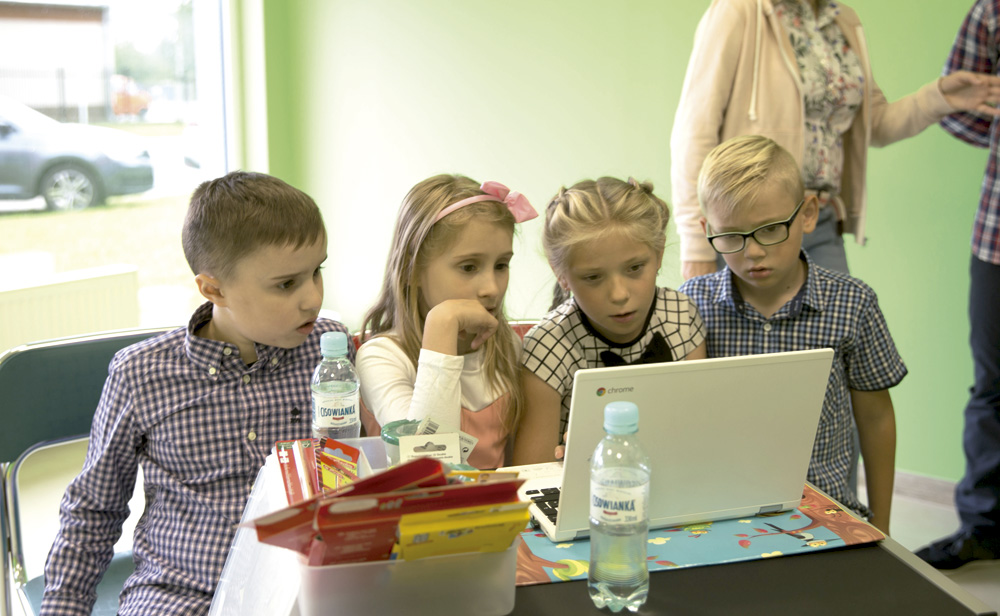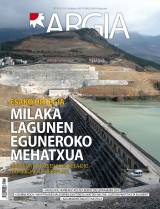The Ikastola has modeled the first schools in Kaxubiera
- We know where Poland is, but not what the cacuban is. However, the school is the result of three years of relationship with Euskal Herria, and this has been made known by Maialen Sobrino (Elizondo, 1988), a colleague of Garabide Elkartea. It has spent five years in Poland, four in Warsaw, one in Poznan.

The Cacubios arrived in the Basque Country.
They approached for the first time around Easter 2015. A sextet went to the ikastola Baztan, among them two parents and their son, one of them minor. It was the year of the Korrika and they were in Bilbao at the festival of the final; they were surprised. As soon as we come back from that first contact, the Korrika went home and this year it was held for the second time. It has the dimension of the Kaxubar, not here, but they have revalued the essence of the initiative. That same year, they arrived for the second time before the Nafarroa Oinez and were able to know the functioning of the ikastola.Ocurri or something interesting. While the parents were in the meeting, the child was introduced into the classroom. There he was with all the other boys, and then, on the way to his house, the boy of Kaxubia threw him: “Dad, why don’t we have such a school?” Simple question, but difficult answer.
You say that you have opened the school.
4 September. It doesn't come from anything. They started working on the educational project. They wanted to teach him in a drawer, but they also had to study his resources. Along with language, they intended to build their own and alternative educational model. A major educational reform is currently taking place in Poland and many people do not agree with the measures that have been taken. So many parents have gone to look for new school models, taking them out of the public. "This is our chance! Kaxubia thought, "Let's think about what we have and what we want." They looked at the Canadian model, the northern countries of Europe, the ikastolas -- which had a little hand.
What model have you worked on?
It consists of three axes. On the one hand, language; it is taught for the first time in Cajubí and the attitude towards other languages is also inclusive. On the other hand, they have opted for the use of ICTs, which have no role but use chromebooks; in order to be able to work in a network, among other things. Finally, special emphasis is placed on communicative competences, such as a school radio study for boys and girls to apply what they have learned and worked on radio. Several agents of the Jednota Association of Kaszebs, the Union of Casubinos, initiated the project and presented the new school model to its associates, obtaining a better reception than was thought, even extending it to society.
They moved on.
Yes. They defined the subjects, found teachers and many other works, including a furniture store to turn it into a restoration school. They even decided where to put it, because it's important. Gdansk is the administrative capital, a large city where the use of cacubí is not very large. They decided, therefore, to open the school in Wejherowo, where it is said to be the soul of the Kaxubia, where the use is most intense, and geographically in the center of Kaxubia.
What presence will the cache have?
The law requires that Polish, as a language, be given five hours a week. They have then decided to devote five more hours to Kaxube, with the intention of equalising the two languages. In the public model, the cacube is optional and takes three hours a week. There is therefore a difference. As for other subjects, this year, 50% of the subjects will be taught computer science, environment, music and plastic in cashier. As for the teaching staff, 80% are Kaxubia speakers, and the rest are committed to learning in Kaxubí, and to this end they have launched a programme.

How many are the Cacubians speaking?
There are 108,000 speakers. On the contrary, those who identify as cacubios are 250,000. They are all in the same region, in Pomerania. In Canada there is a community of exiles, second- or third-generation, and there they also teach cacuban classes. On the other hand, an issue that deserves to be taken into account: Kaxubiano is a Slavic language, not far from Polish, such as Catalan Spanish, for example. That is what they have for and against. Against, because until now it had been considered dialect. Please, for the ease with which you learn.
What is the objective of those who have set up the school?
Strengthen the linguistic community through school. Families who were not speakers of Kaxubí – parents, children and teachers – have approached the school, and with them they want to strengthen the community. When we were there, in early September, there were 20 students. It was 30 at the end of the month, as registration in Poland is open throughout September. They have a Primary Education offer, from 5 to 12 years, divided into three classrooms, per cycle, as is the case of many schools in our peoples. It should be noted that thanks to the work carried out, they have been able to enter the public school network from January 2018.
To what extent is the cacubier present in Poland?
Living in Warsaw or Poznan, asking about minorities, most said that Poland is a homogeneous country, all white, all Catholics… stereotypes! Perhaps there was talk of the Sivisians. Nobody was talking to me about the Kaxubios. When I said, I gathered answers like “And the cacubios?”, they themselves “They are old… It’s a dialect… It’s being lost…”. In contrast, the only language recognised in Poland is Kaxubí, which was recognised in 2005. As a result, the municipalities have subsidies for the teaching of Kaxube in schools, for the placement of traffic signs in both languages, etc. It's not like our officialdom, but it's a step.
What data are they used for?
In Wejherowo the use is 25%. Periphery 10%. However, it is difficult to measure, as there are many passive speakers who understand but do not speak. In many families, it happens that the old people know how to speak in the drawer, but not the others. And teaching at school for three hours ... You can lose your language in two generations.
Is the cacubui in the knob to get lost?
Is the Basque Country in danger of being lost? No... or in some places in Navarre, for example. Perspective. I believe that the work that has been carried out in the last decade in the Kaxubarren Batasuna association and in the Kaszebe radio, which has 150,000 listeners, in Polish and in Cajubí, has awakened consciousness. For example, every year they run a competition for iduric models and have an itinerant library of cajubín works, among others. There are also risks, however…
What do you mean?
Being a diverse cajubino has nothing to do with language. I mean, the former Polish Prime Minister, Donald Tusk, is a cocovid-19 and a member of the largest association of cacubios, but they have no interest in language initiatives, just folklore. There's the shock. In any case, on the other side of the hurdles there are always opportunities.
Badakigu non den Polonia, baina ez zer den kaxubiera. Hala ere, Euskal Herriarekin izandako hiru urteko harremanaren ondorio da eskola, eta horrexen berri eman digu Garabide Elkarteko lankide Maialen Sobrinok (Elizondo, 1988). Bost urte egina da Polonian, lau Varsovian, bat... [+]











